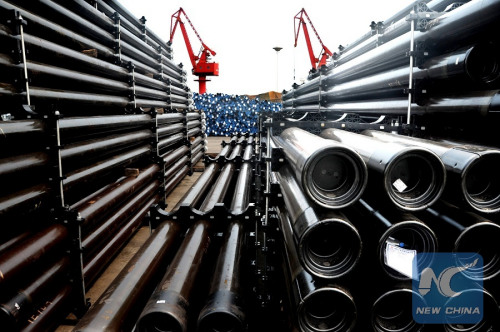
Photo taken on Aug. 1, 2015 shows steel tubes at a dock in Lianyungang Port, east China's Jiangsu Province. (Photo: Xinhua/Wang Chun)
Reports in the British media which pile blame on China for the difficulties of UK steel plants are misleading the public, according to analysts.
Following news that Tata, the Indian industrial giant, wants to shut its steel mills at Port Talbot and elsewhere, media reports have been finger-pointing at China, alleging it is flooding the market with steel products at artificially low prices, supported by subsidies from the Chinese government.
Steel prices have fallen in recent years due to a crash of almost two-thirds in the last five years in the price of iron ore.
According to Statista, a Hamburg-based statistics company, the average price of one metric ton of ore was 55 U.S. dollars in 2015, down from the peak of 168 U.S. dollars in 2011.
Just like the meltdown in the price of crude oil leading to cheaper gasoline, the slump in iron ore prices triggered the downfall in steel prices, said Lu Xiaoming, a steel industry analyst with the China Economic Information Service.
Although China produces nearly half of the world's steel, 88 percent of its products are consumed domestically, and its exports are not large enough to dominate international market prices, Lu said.
In 2014, even though the UK imported twice as many steel products from China as a year earlier, they stood at 687,000 metric tons, compared with the much larger quantity of 4.7 million metric tons from other European countries, the BBC reported.
The accusation against China of government subsidies is also missing the point. The Chinese government has been taking measures to shrink its own capacity in steel production in response to a sluggish world economy. Over the past three years, China has cut 90 million metric tons of steel producing capacity and will further reduce it by another 100-150 million metric tons.
"The ongoing depression in the steel industry is a global phenomenon. The UK is not the only country being affected," said Chinese Ambassador Liu Xiaoming in February.
"In China, the steel industry is having a difficult time too, and hundreds of thousands of steel workers are facing job losses," he said.
There are calls for high tariffs on steel products from China amid Port Talbot's crisis, while it is also believed that the protectionist measure could ultimately hurt the interests of British consumers.
A commentary carried by The Times on Wednesday pointed out that "the global supply glut has forced Tata to sell its UK operations."
The view held by British steel workers and producers that the European Union (EU) measures against China steel exports do not go far enough is "understandable but mistaken," the commentary said.
"There are always costs in a policy of trade protectionism, paid for by consumers with higher prices and by the wider economy," it added.
Even though Britain is importing more steel from China than it used to, it still purchases many more times the amount of steel from the EU, wrote Allister Heath, deputy editor of The Telegraph.
"There are also plenty of UK jobs created thanks to cheap Chinese steel: British companies can buy the stuff and then use it to make goods that they can export at a profit. The last thing we need is a trade war over this issue. Far more jobs would be lost than gained," Heath said.
Addressing the APPCG, a parliamentary group on China in February, Ambassador Liu said that both the Chinese and British governments have engaged in good communications regarding the steel industry.
"Neither side thinks protectionism is in their long-term interests or considers protectionism as a way out. China supports closer dialogue and joint discussion between the steel industries of both countries in order to find a feasible solution," Liu said.


















































